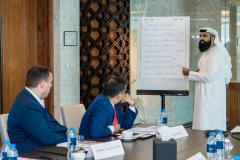Dubai To Host Three-Day Government Foresight Summit

The UAE Ministry of Education in collaboration with Messe Frankfurt Middle East are to host the Government Foresight Summit in Dubai from September 23-25, when regional and international government leaders, strategists, planners, futurists and IT specialists will share best practices to ensure future organisational readiness.
The Summit, held at Le Méridien Dubai Hotel & Conference Centre, will comprise presentations, interactive panel discussions and foresight labs as well as a final day masterclass, which will revolve around the future of human resources, careers and skills.
“This will be an exploration of the future and what all public and private sector leaders need to do to be ready for it, or as ready as they can be,” explained Sarah Phillips, Head of Conferences at Messe Frankfurt Middle East. “It will be a wake-up call with tool kit recommendations from some of the finest brains in organisational preparedness and future-gazing.”
Yet foresight comes with its challenges according to Summit panel member Florence Gaub, Deputy Director of the European Union Institute for Security Studies who works on future-oriented policy-planning with a focus on the Middle East and Europe. She will input on how modern technology can improve foresight, what can be done to mitigate the unpredictable and identifying the foresight mindset.
Summit panellist and strategy artist Jabir Walji of the UK’s Systematic Innovation says changes in governmental mindsets are needed if they are to successfully plan for society and create a better future now. Governments, he says, need to move from ‘Scientific’ mindsets to win-win ‘Holarchy’ mindsets. The mindset sea change, he says, would lead to “cultural innovation.”
Indeed, Walji is turning futurism on its head calling for ‘back cast’ exercises over forecasts. This would involve identifying the ideal future and working backwards how to achieve it. Disruptive thinking, says Walji, is needed in an era in which “the balance between power and knowledge has shifted.”
Walji believes the future of foresight planning is three-way collaboration between the private sector, governments and educational institutions.
And providing insights into the future thinking of educational policy makers and administrators will be Dr. Peter Bishop, Professor Emeritus & Exec Director at the University of Houston who will argue adding uncertainty and emergence to the existing system.
“The uncertainties resulting from the increasing rate of change and more frequent disruptive events require a different approach to planning, one that takes multiple futures into account. The turbulent future environment also requires an approach to planning that emphasizes emergence more than development and contingency more than linearity,” he says.
The final day masterclass will be a probing examination of the future of human resources, careers and skills. “The masterclass will explore the people and technology drivers, future skills forecasting, and the co-ordination required from governments, the private sector and educational institutions,” added Phillips. “The outcomes will identify the new skills needed in the future and how the right candidates can be sourced.”
For more information, visit: www.governmentforesight.com/



